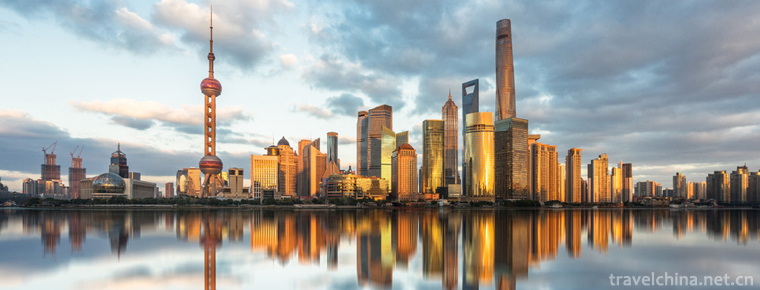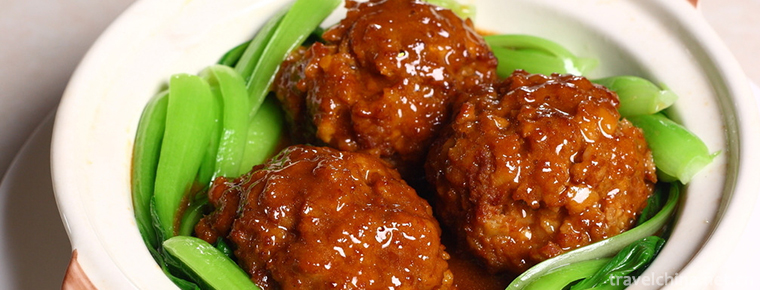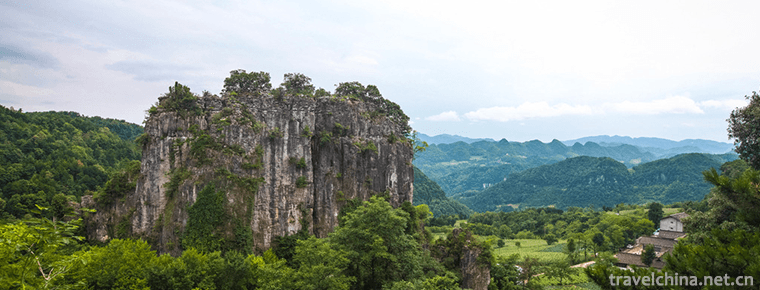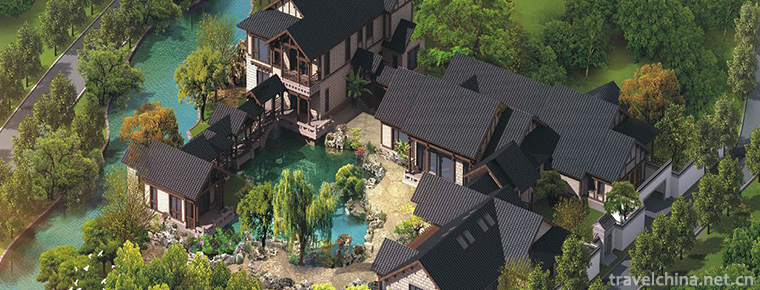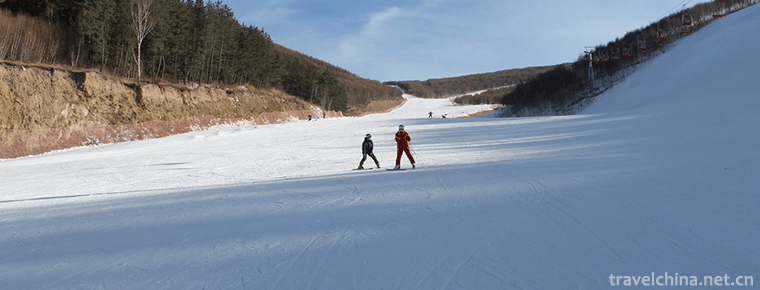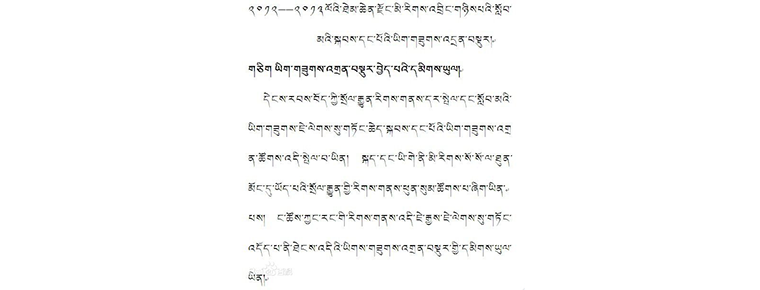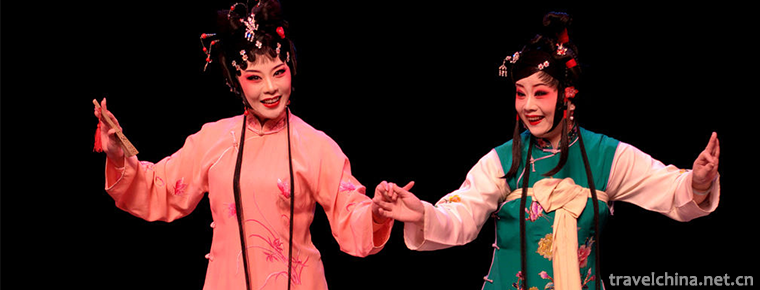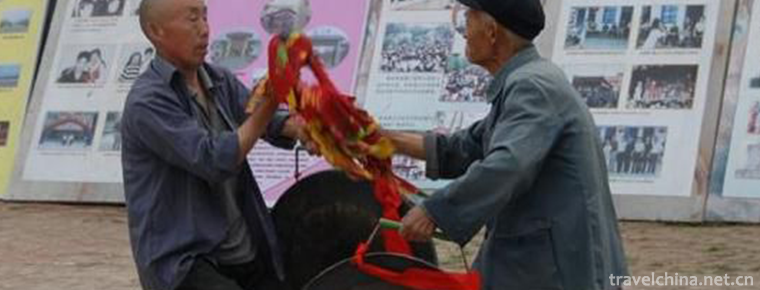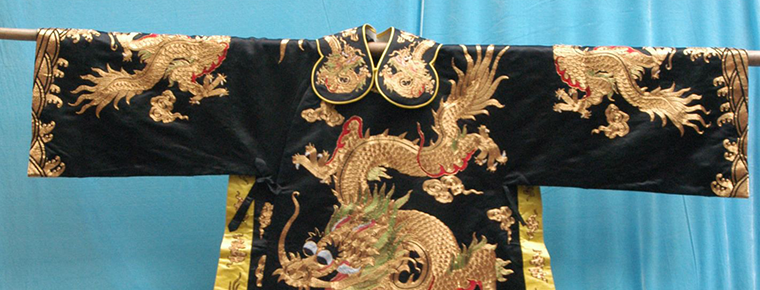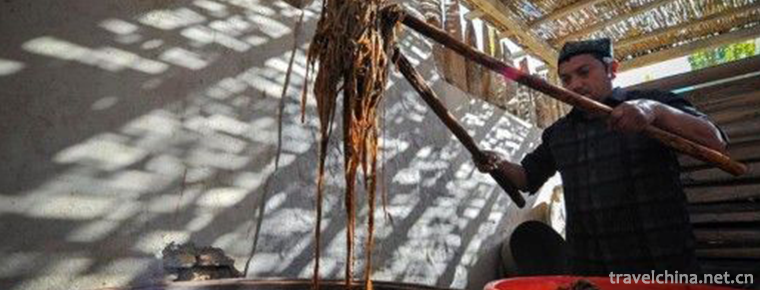Luo Juan Opera
Luo Juan Opera
Luojuan opera, commonly known as trumpet opera, is one of the local operas and one of the national intangible cultural heritages spread in Runan County of Henan Province and Dengzhou City of Henan Province.
Luojuan opera is a combination of Luoju opera and Roju opera. One of the reasons why Luoju opera and Rojuju opera can be integrated is that their singing tones are mostly Palace tones, sometimes legendary tones, and their range is between baritone 3 and treble 1. It has a typical northern opera music style with its rough and bold singing voice and high-spirited. At the same time, roll play is good at literary theatre and Luo play is good at martial arts. In order to complement each other and achieve both civil and military performances, the two kinds of operas often perform on the same stage, which has been recognized by the audience. Later, the masses are directly called roll play.
In 2008, Luojuan Opera in Runan and Luojuan Opera in Dengzhou were included in the second batch of national intangible cultural heritage list.
historical origin
Historical origin
Luojuan opera, one of the opera genres, commonly known as trumpet opera, is a combination of the two ancient operas in Zhongzhou.
Luojuan Opera is an ancient opera which evolved from expelling pestilent ghosts or holding a ceremony of rewarding gods in the old time. According to the Dictionary of Chinese Opera Art, "Luoju Opera is popular in Henan Province and has a long history." It is said that Luoju Opera was originated in Taizong period of Tang Dynasty more than 1300 years ago, and it was a palace drama compiled by emperors and civil and military officials to imitate the celestial music of Tiangong for pleasure. Therefore, Luoju Opera has a long history. It's also called "Lexi".
"Luo Opera" in Luojuan Opera:
Luo Opera originated from Nuo Opera or Nuo Opera. It is an ancient opera that evolved from the old Yingshen Competition to expel the epidemic ghosts or hold the ceremony of rewarding God. Legend has it that in the Taizong period of the Tang Dynasty, the emperor and the civil and military officials imitated the celestial music of the Heavenly Palace to compile the palace opera for pleasure, so the Luo opera was also called "music opera". The main musical instrument of "Luo Opera" is Da Suona (commonly known as the flute), so the folk also called "Luo Opera" as "the flute opera".
"Cinema" in Rolls:
Scroll opera originates from the Scriptures sung by the old Taoist priests in the temple. Because the Scriptures are volumes by volumes, it is called "Scroll opera". Its main musical instrument is Xiao Suona, so it is also called "Scroll opera" by the folk as "Xiao Dizi opera". In order to achieve the performance effect of two kinds of operas, which are complementary to each other, the two kinds of operas often perform on the same stage, often singing in the upper part of a play, singing in the lower part, or singing in the Jiajiao opera, and singing in the second part of a play. Therefore, after the Republic of China, the masses were accustomed to calling "Rolls" or "Rolls" without distinction.
developing process
Luo Opera flowed into Runan in the early Qing Dynasty. The opera was mainly composed of singing folk songs and opera cards, among which "playing children" was the most frequently used one. In singing, men and women are in the same tune, using only real voice, not falsetto. Luo opera has a rough and bold tone, which is more and more exciting. It is suitable for performing martial arts such as mythological drama, palace drama and martial arts.
The circus originated in Chupu and Daitang villages of Yanting shop in Runan County in the late Ming Dynasty. It was a kind of music that monks played and hummed while doing Taoist and Buddhist affairs. The monks called it "circus tune". Later, it merged with some local folk tunes and legendary stories, which gradually changed the "circus tune" into a "circus drama" with story plots. Cinema mostly plays folk tales, local customs and love between men and women.
Luo Xia is good at martial arts and literary arts. Later, artists groped and summarized the two, and finally combined them into one. The common people call it "Luojuan opera".
Cultural characteristics
Music for voices in a Chinese Opera
Luojuan opera generally has a profound singing voice, which pays attention to the rhyme. The Lyric case is seventy words. It is good at euphemism, freshness and elegance. The lyrics of Luojuan Opera have a very unique feature, that is, each large section of lyrics is composed of three long and short sentences, similar to the lyrics of Chinese classical poetry, which has never changed since it was passed down, and the lyrics in its traditional repertoire are very elegant. Experts say that this is probably the result of the joining of literati and ink-writers at the peak of this kind of opera, and it is by no means similar to the smooth-talk of other traditional local operas. Lyrics, with the flavor of the ancient Kunqu opera Beijing opera, stick to the singing style like ci-poems.
Accompaniment instrument
The music of Luojuan opera has its own style. The main accompanying instruments are the dodder, flute, suona, sheng, stuffy son, etc. In martial arts, horns of sheep and trumpets more than three feet long were added. The percussion instruments of Luojuan Opera include drum board, gong, cymbal, small cymbal, small gong, tanggu, big drum and bangzi. With the development of music, bow string instruments such as Erhu, Banhu, Quhu, Da and Violin have been added, which are rare in other operas. Where the two armies fight and other scenes, all the wind instruments and percussion instruments are playing together, there are thunder and lightning, the magnificent momentum of the Golden Horse.
Profession
The industry of Luojuan opera has its own characteristics. It has all kinds of life, dan, Jing and ugliness. It can perform many characters. The performers have absorbed folk arts such as martial arts, acrobatics, dance, stilts and dry boats from different perspectives, forming a unique style.
perform
Cinema is good at literary theatre, while Luo is good at martial arts. In order to attract audiences and achieve the goal of mutual benefit between civil and military, the two kinds of plays often perform together and gradually merge into one. After the Republic of China, the masses in Runan area called it "Luojuan opera" or "Luojuan opera" according to custom. Luojuan opera Bai mostly uses local dialect and Zhongzhou rhyme. The melody of the aria is also close to the rhythm of the local folk voice, which has very distinct local characteristics.
Representative repertoire
Up to 2008, Luojuan Opera has gradually formed in the long-term development process, represented by "Xi Mei Case", "Nanyang Pass", "Li Zijinglin Fan", "Zhu Hongwu Hanging Filial Piety", "Dragon Grabbing Bear's Daughter", "Liu Jinding Xia Nantang", "Huadao Chao" and "Four Saints Returning to Heaven".
Distribution area
Luojuan Opera is one of the local operas which are spread in Runan County of Henan Province and Dengzhou City of Henan Province. Beyond Henan Province in the beginning, Luojuan Opera is also spread in Hebei, Shandong, Shanxi and Shaanxi provinces.
Inheritance and protection
Inheritance value
1. Luojuan opera is not only a means for artists to earn a living and a way to express their feelings, but also an important carrier of national spirit and emotion.
2. Luojuan opera Bai mostly uses local dialect, local dialect and Zhongzhou rhyme. The melody of the aria is also close to the rhythm of the local folk voice, which has very distinct local characteristics.
Inheritance status
Nowadays, young people are unwilling to learn to act in Roju opera, which is handed down from generation to generation and has few successors. This drama is facing the dilemma of losing its repertoire.
Inheriting characters
Liu Changke, male, Han nationality, in May 2018, was assessed as the representative successor of the fifth batch of National Intangible Cultural Heritage Representative projects.
Sun Sanmin, male and Han, was assessed as the representative successor of the fifth batch of national intangible cultural heritage representative projects in May 2018.
protective measures
In May 1988, the government of Runan County organized relevant personnel to collate and publish the Music Collection of Runan Luoju Opera, recording and preserving the words and songs dictated by the artists.
In July 2005, the Fanxian government organized the establishment of the "Fanxian Dizi Opera Protection Leading Group".
social influence
In 2005, the roll-up drama "Striking Golden Toad" and "Hairui Search Palace" performed by Runan Team won the gold medal of the second Henan Folk Literature and Art Festival.
From March 18 to April 3, 2010, Luojuan Opera participated in the exhibition of intangible cultural heritage in Henan (Huaiyang).
Cultural anecdotes
In the early Tang Dynasty, there was no such art form as opera. One day, Li Shimin watched Tianju in his dream and was fascinated by it. When he woke up, he told the scene in his dream to Zuo Prime Minister Tang Zhiyuan. Tang Zhiyuan compiled a script accordingly. Li Shimin's mission was to select smart children from all over the world to rehearse according to the opera prose. After performing in the palace, they could see their wives'eyebrows and laughter. So Li Shimin called the opera "Le Fu Opera". Later, it was passed on to "Luo Ron" opera.
On the shore of Suya Lake, where the spring is melting and the waves are shining, we can see that the water and the sky are the same, the green trees brush the dike, the willows on the banks are green, and the wild birds flock together. Runan County is the home of Luojuan Opera, which has flourished for hundreds of years in Fangyuan. A hundred years is like a flash. Faced with this beautiful natural and human beauty, my thoughts have been immersed in the 400-year ups and downs of Luojuan opera for a long time. If it is true that this area has now become a vast School of silver waters, has bred and completed a rare opera for hundreds of years of brilliance, in the Hongru River Basin generation after generation as leisurely as water over the rings of the sun, witnessed people in the ordinary days of joy, anger, sorrow and joy to deduce the earth as simple and kind life. It is the grass-roots people's love of life, engraved in the deep skeleton and running in the blood, that gives birth to the beautiful flower tree of drama. On the two tallest and lightest branches of this flower tree, there are two amazing flowers. This is the Luojuan opera in Runan County.
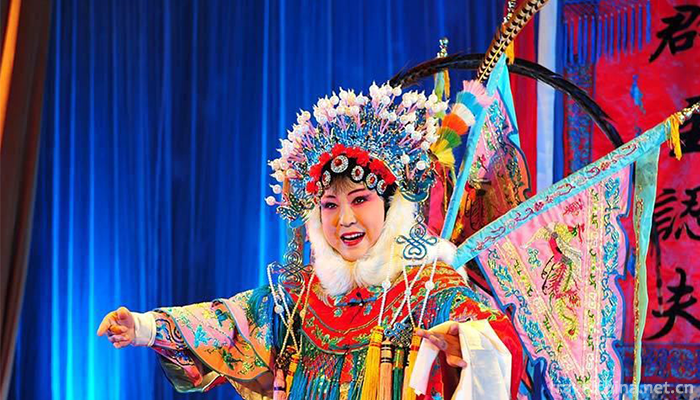
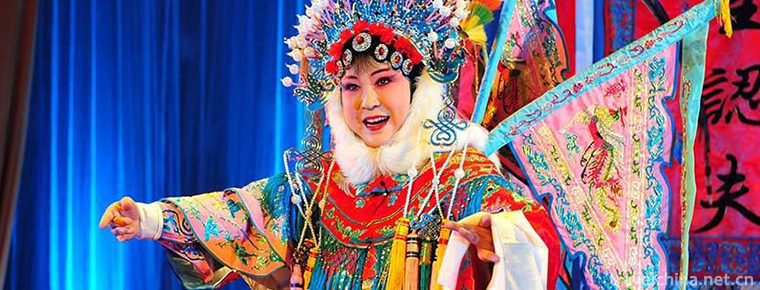
Luo Juan Opera
-
Shanghai
People's Republic of China municipality directly under the central government
Views: 299 Time 2018-10-12 -
Stewed Pork Ball in Brown Sauce
Lion head is a traditional dish in the Huaiyang cuisine of Yangzhou, Jiangsu, China. Legend has it that Lion's Head began in the Sui Dynasty
Views: 394 Time 2018-10-27 -
Zengjiashan Scenic Area
Zengjiashan Scenic Spot is located in Chaotian District of Guangyuan City, south foot of Qinba and the combination of Sichuan and Shaanxi. It covers 6 townships and townships with 70,000 people
Views: 149 Time 2019-01-04 -
Huanshui Bay Hot Spring Resort
Huanshui Bay Hot Spring Tourist Area of Anyang City is located at the exit of Anlin Expressway in Anyang Hi-tech Development Zone, Henan Province, close to National Highway 107 and the west side of Be
Views: 324 Time 2019-01-17 -
Jilin Beidahu Skiing Ground
Jilin Beidahu Skiing Ground is located in Jilin Beidahu Development Zone, 53 kilometers away from Jilin urban area. Entering the ski resort, facing the Asian Games Village Hotel.
Views: 171 Time 2019-01-19 -
Tibetan calligraphy
Tibetan calligraphy is an important part of Tibetan culture and art. In the seventh century AD, during the Zampson Zangganbu period of Tubo, minister Tunmi Sampuza absorbed the advantages of different
Views: 176 Time 2019-04-05 -
Legend of Chen Sanwuniang
Li Jing Ji of Chen Sanwuniang is an ancient folklore, belonging to the legendary works of Ming Dynasty in China. The author has lost his life in Quanzhou (Chen Sang) of Fujian Province
Views: 119 Time 2019-04-16 -
The official will ring Gong
Official Guild gongs are widely spread in rural areas of Eastern Henan Province. It is a traditional percussion instrument with brass gongs as props. It has a history of more than 300 years
Views: 113 Time 2019-05-01 -
Drama Costume and Opera Production Skills
Drama costume and costume production skills, local traditional handicraft in Suzhou City, Jiangsu Province, one of the national intangible cultural heritage.
Views: 151 Time 2019-05-08 -
Uygur Mulberry Paper Making Skills
Uygur mulberry paper takes mulberry branch endothelium as raw material, mulberry branch endothelium is sticky, smooth and delicate, easy to process, after exploitation, soaking, pot boiling, pounding,
Views: 147 Time 2019-06-28 -
Dagu Glacier
Dagu iceberg scenic area is located in Heishui County, Aba Tibetan and Qiang Autonomous Prefecture, Sichuan Province, China, 102.44.15-102.52.46 E and 32.12.30-32.17.06 n, which is a rare modern mountain glacier.
Views: 364 Time 2020-11-07 -
Guangyuan tertiary industry
In 2018, the total social fixed asset investment in Guangyuan was 67.221 billion yuan, an increase of 14.1% in the same caliber. Among them, investment in fixed assets was 64.721 billion yuan, an increase of 16.4%.
Views: 329 Time 2020-12-15
